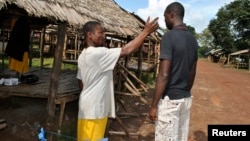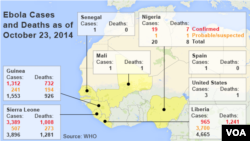Liberian officials and the World Health Organization say the number of new Ebola cases in Liberia appears to be falling but that it’s too soon to be sure. Liberia has been the hardest hit by this regional epidemic with approximately half the total cases and deaths.
Ebola has killed at least 2,413 people in Liberia since April. Some experts have suggested it could kill tens of thousands more by year’s end.
However, health authorities there say that over the past two weeks the rate of infection appears to be dropping slowly.
The WHO says it is “cautiously optimistic.”
Liberia’s assistant health minister and head of the government’s Ebola response, Tolbert Nyenswah, says now is not the time to relax intervention efforts.
“That is safe burials, improve our contact tracing active case size, make sure that our number of treatment beds are increasing, increase our ETU’s at county level, making sure that people are taking preventive measures, and commitment to mobilization is critical," Nyenswah said.
Doctors Without Borders runs the largest Ebola treatment unit in Liberia. It was overflowing just two months ago. They were having to turn patients away. Since mid-October, they've had empty beds.
“We have 79 out of 190 beds occupied," explained MSF Medical Coordinator in Liberia, Natasha Reyes. "So that’s now less than half. And that’s quite new for us. We used to have over 100 patients in the confirmed area.”
She says that does not mean there aren’t still sick people in communities.
“We need to have a better surveillance of the community. We need to have better tracing of the contacts of the patients that we have for us to have a really good picture and for us to draw any conclusions," Reyes said.
The country’s burial teams say they are also picking up fewer bodies.
Marcus Speare, who runs burial operations for Margibi County just outside Monrovia, says community resistance remains.
“There are [a] few persons of families that are still hiding sick persons and we want them to begin to cooperate with the health program," he said.
Medical experts say Ebola victims are at their most contagious after death. Safe burial requires family members to have no physical contact with the bodies -- a practice at odds with Liberian tradition.
MSF’s Reyes says that could still be deterring sick people or their family members from coming forward.
“It may be discouraging people from accessing our centers because if I were sick, I would be afraid to go in because that if I die I will be cremated and that my family will never see me again," she noted.
According to health workers, the “downward trend” in new cases is promising. Ramped up response efforts are having an impact.
But they are quick to point out that Liberia and neighboring Guinea and Sierra Leone have seen other dips in cases over the course of this now eight-month epidemic only to have the virus spread and resurge.





